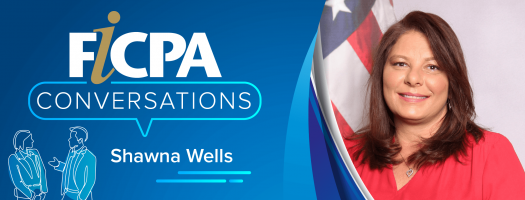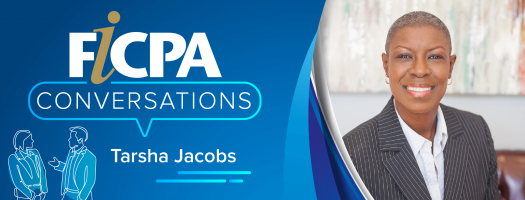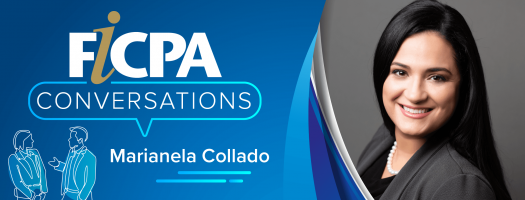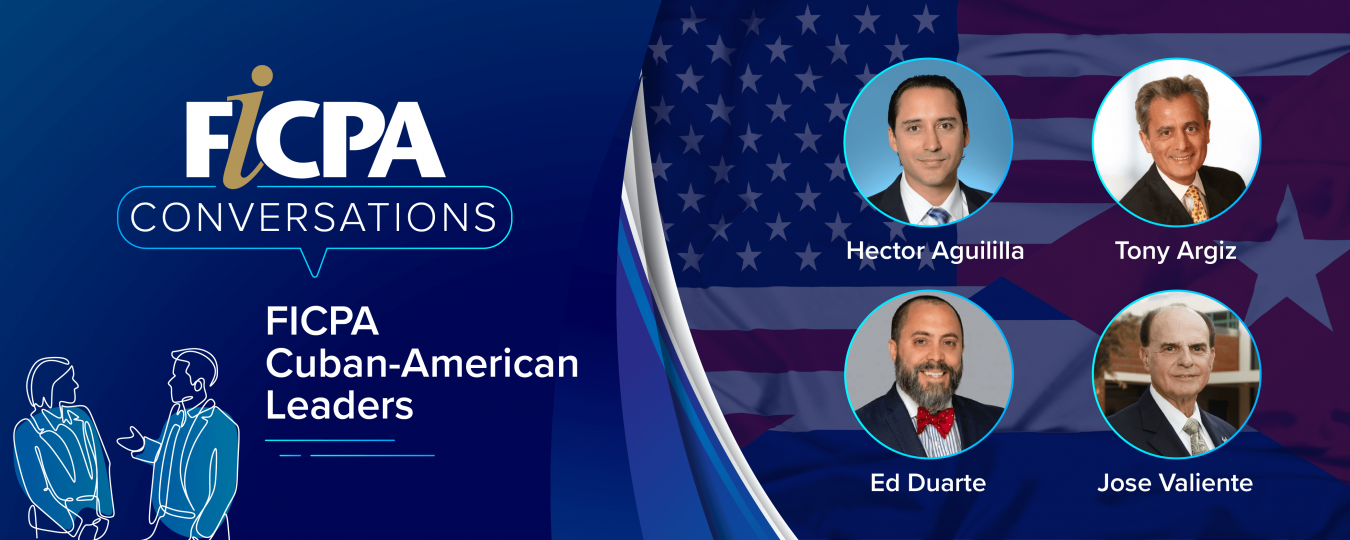
The FICPA was proud to celebrate Hispanic Heritage Month earlier this fall, honoring the achievements of so many Hispanic American CPAs in Florida.
For the latest installment in our FICPA Conversations series, we turned to four of our CPA leaders whose families fled Cuba in search of a better life in the United States.
Hector Aguililla is a director at Berkowitz Pollack Brant and a member of the FICPA’s Board of Directors; Tony Argiz is the South Florida Managing Partner at BDO USA and past Chair of the Florida Board of Accountancy; Ed Duarte is the CFO of Foreign Parts Distributors and a member of the FICPA Council; and Jose Valiente is a retired partner CliftonLarsonAllen and a past President of the FICPA.
They were kind enough to share their time and stories of struggle, hope and inspiration, as they worked to assimilate, strive and succeed in their adopted home.
Tell us how and when you first came to the United States.
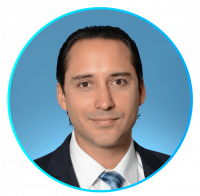
Aguililla: I came to the United States from Cuba when I was 10 years old, during the Cold War in the 1980s. My father was a Cuban diplomat for the Middle East and my mother worked with him. At the time, tensions were high between the U.S. and the Soviet Union. My father and mother would work 10 months out of every year in the Middle East and would only be in Cuba during the summer. The Cuban government would not allow parents to take their children out of the country after they were of school age – for fear they would defect. When I was 10 years old, my parents were tired of living without me, so they requested special permission to take me with them. The government relented and allowed me to go. My parents took this opportunity and defected to the U.S. while en route to the Middle East. The CIA was happy to accept my father’s defection, as this brought much-needed intelligence to the U.S. during the Cold War.
When we arrived, the U.S. government gave my father a job in their international relations think tank in Washington D.C. I did not speak English when I arrived, and I was the only Spanish speaker in my first school. Although it was a tough first year, it was ultimately a great learning experience, as I was able to learn the language and the customs at a very fast rate.
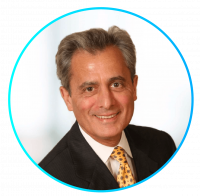
Argiz: I came to the U.S. from Cuba when I was 9 years old through Operation Pedro Pan, an exodus of 14,000 unaccompanied Cuban children to the United States.
Although the U.S. was welcoming, it was still hard to assimilate. I did not speak English when I arrived, and I had been brought up in a completely different culture. The hardest part was that I had no idea if I would ever see my parents again, and I was too young to fully grasp why I was being sent away. That was a sacrifice they made to give me the opportunity to live the American dream. Luckily, I was reunited with my parents five years later.
I think of Cuba every day. It is the country where I was born and the country where my grandparents are buried. The culture and people have shaped my life, and I would never want to forget my roots. However, the U.S. is my home now, and I feel extremely proud and honored to be an American. The country took me in while I was still a young child and gave me hope and opportunity. I will always be deeply indebted to the charity and kindness so many Americans showed me during my earliest years in the United States, which is why I now prioritize giving back to my community as a small way to show my gratitude.
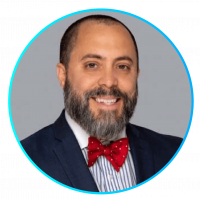
Duarte: I was born in New York to Cuban parents who emigrated from Cuba during the late 1960s. My father and some of his siblings worked in the sugarcane fields for nearly 12 months to secure their departure from Cuba, as the Castro Administration would start to build the strength of their communist revolution. Simultaneously, in the eastern part of Cuba, my mother, along with my grandparents and uncles, would leave the island.
My parents met in New York in 1970 and would marry and raise three boys, before moving to Miami in 1978. During our time in New York, my father would work two jobs to support our family. New York embraced hard-working Cubans, and it was through my father’s work ethic and sacrifice that our family would be provided the opportunity to live the American Dream. I would eventually return to New York City in 1998 to start my career in public accounting. I then started my very own family in the city where it all began for us.
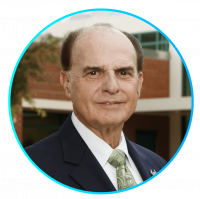
Valiente: On Oct. 5, 1962, my father and I arrived in the United States as totally penniless, human refugees. This great country welcomed us with open arms and extended to us every opportunity to enjoy the American dream.
We had applied to leave Cuba as a family unit – together. But when the notices came to leave, they only came for my father and me. My parents had to decide whether to wait and try to leave together as a family, or whether my father and I should leave first. Because I was almost 12 years old, I was – believe it or not – close to military age, and my parents didn’t want to take a chance.
So, my father and I arrived in Miami on Oct. 5, and at the end of that month was the Cuban Missile Crisis. Afterward, Castro decided there would be no more flights out. I did not see my mother and sister until we were finally reunited in Tampa – three years later. That was our story, and there are so many like that of people who struggled to leave.
What were those early years in the U.S. like, and how did being a young Hispanic immigrant inform your sense of purpose in life?
Aguililla: During my early years in the U.S., we moved often – partly for security reasons and partly in search of better opportunities. I was usually in schools with zero or very few Spanish-speaking students. I became an expert at being the new kid in the school. Those experiences have served me well in life, as it’s now very easy for me to make friends and develop relationships with clients. I found there is a universal language that everyone understands, one of kindness, friendliness, humility, love. I learned that although a few students had certain biases, a great majority of students were curious about my culture and very helpful in teaching about theirs.
I was helped tremendously by my friends, my teachers and my neighbors; it truly takes a village to raise a child. This instilled in me a sense of giving back, to make sure I would always help those in need, just as I was helped in those tough early years in a new country, in a new culture, and with no extended family.
Argiz: When I arrived in the U.S., I was alone and became a ward of the Catholic Church in Tampa, under the leadership of Monsignor Walsh. They housed, clothed, fed and educated me for five years. Without the support of the church, my path in life would have been completely different. Still, it was an extremely difficult adjustment. It took a long time to learn the language and adapt to a new culture, food and way of life.
I learned how to be self-reliant, since I could not just go home and ask Mom or Dad for a couple of dollars. If I wanted cash, I had to go out and get summer jobs, whether it was cutting someone's lawn, cleaning the plastic pools at Montgomery Ward in Tampa, or working as a busboy.
Duarte: I remember living in a one-bedroom apartment in Freeport, New York. Although I was born in the U.S., I learned the English language through my interaction with my teachers, friends and family. With three young boys to support, my parents never had the opportunity to obtain their education. At home, the Cuban culture was in full force. Language, food, art and respect were key ingredients in the Duarte household. I learned the value of hard work and the appreciation that an education would provide increased opportunities for my family and me.
When we moved to Miami, we lived in a two-bedroom duplex, where my two brothers and I shared a room. I have incredible memories of love, unity and humility. Education was a must in our household. My father would always use his experience as an example and motivation, telling us we could accomplish anything we wanted if we took advantage of the opportunity and education system in the U.S. – something his family and many others still don’t have in Cuba. One lesson I learned was that with sacrifice comes reward. I would witness my father’s work ethic and business acumen, as he managed a landscaping business during the day and worked as a custodian at night, supporting our family and ultimately leading to the purchase of our first home. As busy as he was, he never hesitated to help a family member or friend in need. He would give his last dollar, some food and the shirt off his back to help someone else. From this kindness, I would learn to enjoy giving back to my community and those in need.
Valiente: When my father and I arrived, I didn’t know any English – none whatsoever. And back then, there wasn’t any bilingual literature and there weren’t bilingual teachers. You either learned English or sank. I learned a lot of my English on the playground, playing baseball, hanging around with other kids and trying to understand what they were saying.
Our first home in Tampa was in the housing projects of Ybor City. As poor as we were back then, getting a good education wasn’t a choice – it was a requirement. There was a famous saying that I’m sure just about every Cuban parent told their kids: “They can take away your possessions, but they can never take away your education.” Education was of paramount importance to Cuban families.
Years later, I found out that our neighbors, a couple who had no children, were able to get me a scholarship to go to a Catholic school. From there, I went on to Hillsborough High School and to the University of South Florida (USF). We were fortunate to have USF in our backyard. I knew from Day 1 that I wanted to be an accountant. And seven years later, my sister went on to graduate from USF herself – as an industrial engineer. My parents were invested in our education.
How have you seen the Hispanic American community in Florida evolve?
Aguililla: During my career, it has been an honor to be a part of various Hispanic American business organizations in South Florida. When they were established, their purpose was to help Hispanics to conduct business in a country not of their birth. These organizations have thrived and helped countless Hispanic American families live the American dream. Today in Florida, we have numerous Hispanic American professionals leading our largest industries as managing partners of public accounting firms, CEOs of public companies, presidents of banks, business owners, educators and more.
The Hispanic American community in Florida is an integral part of our great state. My dream is to see a free Cuba, where CPAs can help establish a financial system to support a democracy with a free economy. My heart aches when I see what is happening now in Cuba, where the government oppresses its citizens. I dream of a future Cuba with a free economy and a return of CPAs to Cuba.
Argiz: Many Cubans came to the U.S. in the 1960s and needed to build capital to support their families and start their businesses. Now, many of us are in a position to become philanthropists and give back to our communities, whether financially or through various volunteer efforts.
Duarte: I have been fortunate to be surrounded by many Hispanic leaders in our community, especially those who created the legacy in our profession for us to follow. I had the opportunity to lead the Cuban American CPA Association and Foundation and to work closely with other organizations. The Hispanic American community is a staple of South Florida. With rapid changes in technology and continuing growth in our state, Florida is positioned to be one of the great states in the U.S. As a Cuban American, it saddens me to see the oppression in Cuba today. I pray that the citizens of Cuba can one day experience the opportunities we have here in America.
Valiente: When I arrived, the overwhelming majority of immigrants in South Florida were Cubans. But then, over time, we started getting more people from South America, Central America, Mexico and Puerto Rico. People like to call it a “melting pot,” but there’s a better term for it. In a melting pot, the ingredients lose their identity – they melt. I like to call it a paella. There are many great ingredients that give taste to the main dish, but we don't lose our identity. And as the Hispanic community has evolved, we’ve advanced into positions of leadership.
What kind of legacy do you hope to leave behind for younger Hispanic Americans who look to follow in your footsteps?
Aguililla: I hope to leave behind a legacy honoring those who came before us, who paved the way for our success; a legacy of passing on our values and our culture to the next generation; a legacy of being thankful to a country that took us in and provided everything we ever dreamed of and lacked in our countries of birth; a legacy of helping those in need and giving back to our community and our neighbors.
Argiz: Helping others is characteristic of Hispanic cultures and families. I believe the best way to honor our Hispanic heritage is to pay it forward – not just through financial donations but by volunteering time, expertise and mentorship. That is what I was taught to do, what I am teaching my children and grandchildren to do, and what I hope to see from future Hispanic generations and leaders. I hope to leave behind a legacy of giving back.
Duarte: I learned through my journey that helping others is a key benchmark to a rewarding life. I give back my time to our community and various organizations. I have taught my children the importance of enjoying the journey, no matter how difficult the road or how many obstacles they encounter. I would like to see our legacy carry into the next generation of Hispanic American leaders, as we honor those who came before us and the current leaders of today.
Valiente: Whenever I speak to groups of young people, I try to leave them with three main pieces of advice. First, always do the right thing. Never compromise your integrity for anything for anyone. Second, do not be afraid to fail. Winners are never afraid to fail. And when you do fail – as most people do – take the opportunity to learn from it and to overcome adversity. Finally, I like to reference a book called “212: The Extra Degree.” The idea is that at 211 degrees, water is just hot; but at 212 degrees, it boils. It’s all about that one extra degree of effort and tenacity that separates the great from the average.
